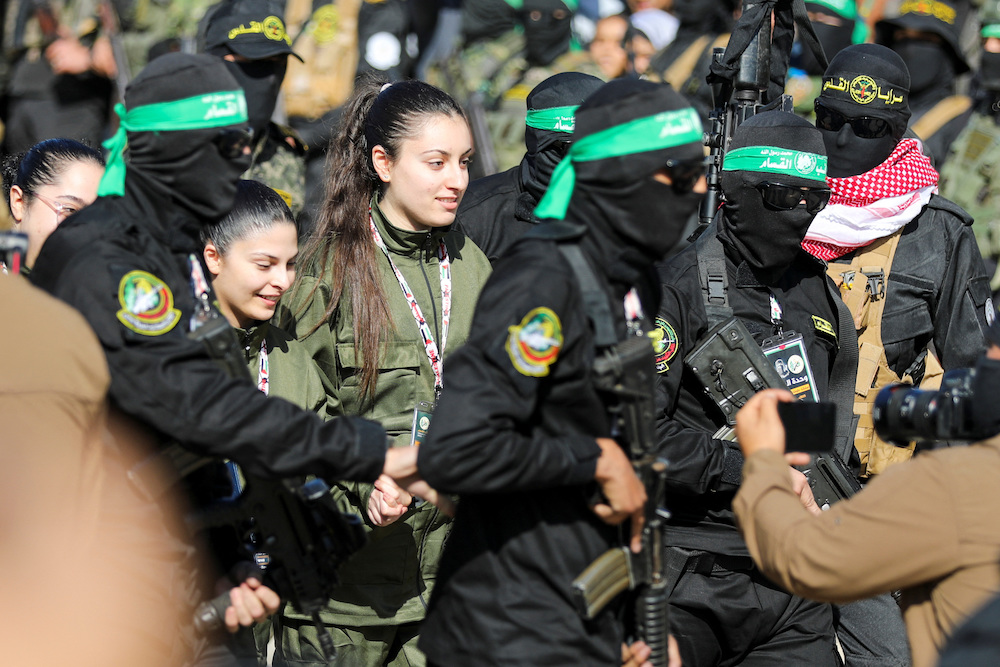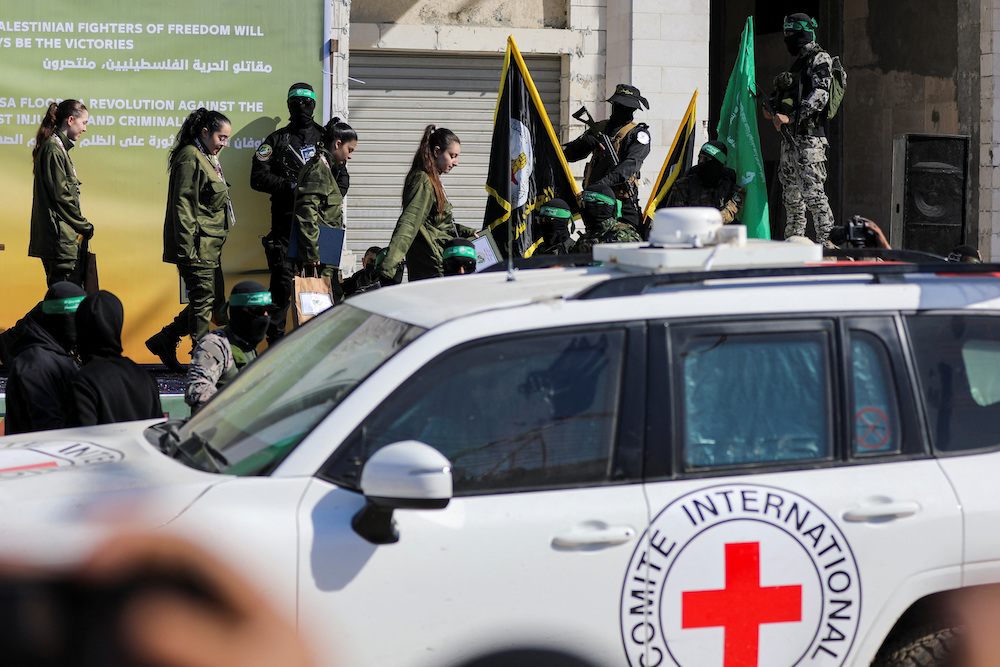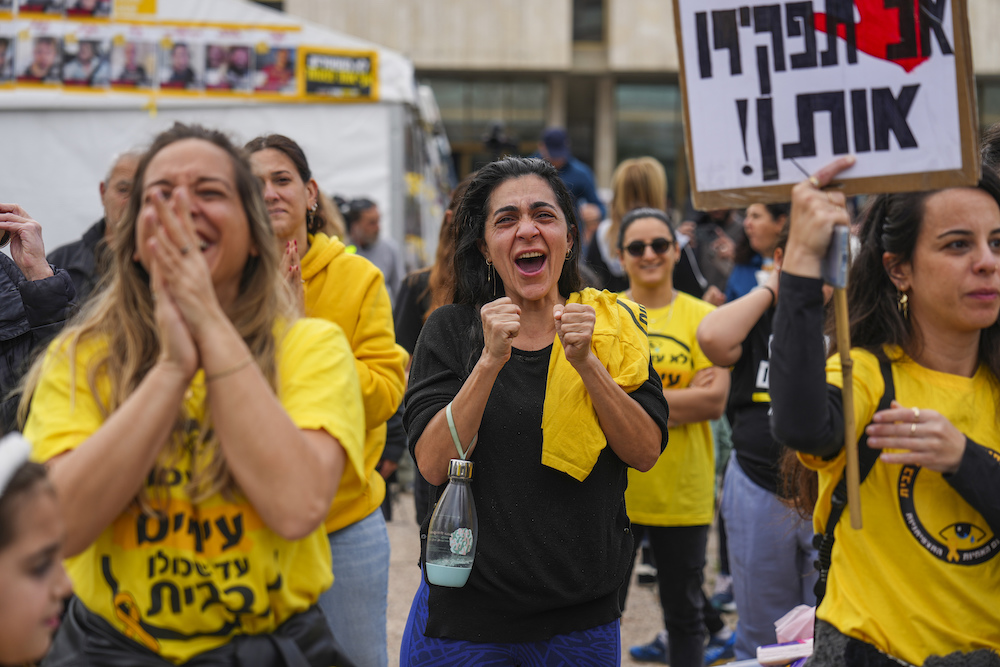CAIRO: Accusations of sexual misconduct directed at two prominent human rights lawyers in Egypt — one of them a former presidential hopeful — have roiled the country’s beleaguered civil society, which is already under unrelenting pressure from authorities.
The allegations, directed at former presidential hopeful Khaled Ali and another lawyer, were made in a private email sent by a woman in October that has since been widely shared on social media. Many have cast it as part of the global #MeToo campaign against sexual assault and misconduct, while accusing the activist community of closing ranks to avoid embarrassment.
The woman, currently living in Europe, has declined to give media interviews and has not filed a complaint with authorities. The Associated Press does not publicly identify victims of sexual assault and is not naming the second lawyer because no formal complaint has been made against him.
In the email, the woman alleged that Ali invited her to his downtown Cairo office in 2015 after other employees had gone home. The woman, who had recently quit her job at the rights organization founded and led by Ali, said he offered her a beer before he left to shower next door. When he came back, he asked her personal questions about two of her past relationships, she said.
“I finish the beer and tell him I need to leave because I have an appointment in the morning,” she recounted in the email. “He tries to convince me to stay over and that it’s getting late. I tell him no, I prefer to go,” she wrote. She said she left without further incident.
She said the other lawyer, who specializes in women’s rights, had suggested she spend the night at his place after an evening of heavy drinking at a downtown bar with friends in 2014. She said she took him up on the offer because she was drunk, and that he raped her that night.
She said she has been in therapy to deal with the trauma, and that her email was meant as a warning to women employed by rights groups. Two of her friends, who spoke on condition of anonymity to preserve her privacy, said she told them she decided to break her silence when she learned that Ali planned to run for president.
The lawyer denied the rape allegation in a phone interview with the AP, saying he had “consensual” sex with the woman. In the email, she acknowledged having consensual sex with him after the alleged rape.
Ali responded to the accusations leveled against himself in a Facebook post on Feb. 19, calling them “extremely shocking and surprising.” He said he had ordered his campaign and his Bread and Freedom party to investigate the allegations shortly after they surfaced and had refrained from commenting publicly until the investigation was complete.
The three-person panel of supporters cleared Ali of any wrongdoing but reprimanded him for mixing his personal life with his political work. The accuser questioned the panel’s objectivity and refused to cooperate with it.
“The mere thought that she entertains such thoughts about me and wrote an email reflecting them leaves me with no choice but to offer her an apology for the pain she suffered,” he wrote. “Although the findings of the investigation are in my favor, I must still take some of the blame.”
Ali resigned from his leadership of the party, as well as the rights group he founded. Several telephone calls and messages to Ali seeking comment went unanswered.
Supporters applauded his response, calling it a rare show of accountability in a conservative society where sexual harassment is rampant and sex crimes are rarely acknowledged or prosecuted.
Others say his campaign dodged the allegations while trying to get him on the ballot. Ali declared his intention to run for president in November but quit in January, citing intimidation by authorities. The panel released a summary of its findings after he abandoned his run.
President Abdel-Fattah El-Sisi is widely expected to win re-election in the March 26-28 vote after several potential candidates withdrew or were arrested. The only other candidate to make the ballot is a little-known politician who supports Sisi.
Egypt’s civil society, which played a key role in the 2011 uprising that toppled longtime autocrat Hosni Mubarak, has been the target of a sweeping crackdown since Sisi led the military overthrow of an elected Islamist president in 2013.
Several prominent activists have been arrested, while others have been banned from travel or had their assets frozen. Their organizations have been subject to draconian restrictions, and pro-government media routinely portray them as depraved agents of hostile foreign powers.
But critics within the rights community say none of that excuses the response to the allegations against Ali.
The “Girls’ Revolution,” a women’s rights group, issued a statement saying Ali’s supporters had not acted quickly enough.
“Although the leadership of the party was informed of the email in November, the campaign went on despite the suspected abuse,” it said.
More than 100 activists, including many women, signed a declaration saying the panel, which was appointed in December, “mirrored the state’s criminal justice system, complete with its deficiencies (and) lack of safety for those who complain.”
It said the handling of the case, like that of allegations against other public figures, was dominated by the “spirit of the clique” — a desire to shield prominent individuals from criticism and protect the international image of civil society groups, many of which received support from abroad before the latest crackdown.
Several prominent women’s rights activists declined to comment on the case.
But Mona Eltahawy, an Egyptian writer and activist based in New York, said the response from Ali’s supporters shows that “their revolution is not genuine because the essence of the things we are struggling against remain inside them.”
“The woman who wrote the email deserves much more justice than she has received so far,” she said.
Egypt’s embattled activists face a #MeToo reckoning
Egypt’s embattled activists face a #MeToo reckoning

Hamas frees four Israeli hostages to Red Cross in Gaza

- Israel is to free 200 Palestinian prisoners in exchange for the hostages
- The hostage-prisoner exchange is part of a fragile ceasefire agreement between Israel and Hamas
GAZA CITY, Palestinian Territories: Hamas militants on Saturday handed over to the Red Cross four Israeli women hostages under a truce deal in the Gaza war that is also expected to see a second group of Palestinian prisoners freed.
An AFP journalist witnessed the handover after the four were presented on a stage at a main square in Gaza City, where dozens of masked, armed militants had gathered earlier.
The Israeli military later confirmed they have received the freed hostages.
Four Red Cross vehicles had arrived ahead of the handover.
The fighters from Hamas and Islamic Jihad, carrying assault rifles and rocket-propelled grenade launchers, gathered in rows, many carrying their groups’ banners and wearing green headbands, as crowds of Gaza residents gathered to watch.
Israel confirmed Friday that it had received a list of the hostages’ names.
On Saturday, Palestinian sources said Israel is to free 200 Palestinian prisoners in exchange for the hostages.

According to the Israeli Hostage and Missing Families Forum, a campaign group, the women released are Karina Ariev, Daniella Gilboa, Naama Levy — all aged 20 — and Liri Albag, 19.
They had been held captive for more than 15 months, since Hamas’s October 7, 2023 attack on Israel.
Palestinians displaced by the war to southern Gaza should be able to begin returning to the north following Saturday’s releases, Bassem Naim, a member of Hamas’s political bureau based in Qatar, told AFP on Friday.
The truce has also led to a surge of food, fuel, medical and other aid into rubble-strewn Gaza but Israel’s UN ambassador on Friday confirmed that the UN agency for Palestinian refugees, Gaza’s main aid agency, must end all operations in Israel by Thursday.
The hostage-prisoner exchange is part of a fragile ceasefire agreement between Israel and Hamas that took effect last Sunday, and which is intended to pave the way to a permanent end to the war.
Mediators Qatar and the United States announced the agreement days ahead of US President Donald Trump’s inauguration. Trump has since claimed credit for securing the deal after months of fruitless negotiations.
Abu Obeida, spokesman for the Ezzedine Al-Qassam Brigades, Hamas’s armed wing, said on Telegram Friday that “as part of the prisoners’ exchange deal, the Qassam brigades decided to release tomorrow four women soldiers.”
Israeli Prime Minister Benjamin Netanyahu’s office confirmed it had received the names through mediators.
According to Israel’s prison service, some of the Palestinians released will go to Gaza, with the rest returning to the Israeli-occupied West Bank.
The ceasefire agreement should be implemented in three phases, but the last two stages have not yet been finalized.
“The worry and fear that the deal will not be implemented to the end is eating away at all of us,” said Vicky Cohen, the mother of hostage Nimrod Cohen.

In Gaza, families displaced by more than a year of war longed to return home, but many will find only rubble where houses once stood.
“Even if we thought about returning, there is no place for us to put our tents because of the destruction,” Theqra Qasem, a displaced woman, said.
During the first, 42-day phase that began Sunday, 33 hostages Israel believes are still alive should be freed in staggered releases in exchange for around 1,900 Palestinians held in Israeli jails.
Three hostages — Emily Damari, Romi Gonen and Doron Steinbrecher — returned home on the first day of the truce.
Ninety Palestinians, mostly women and minors, were released in exchange.
The deal’s second phase is to see negotiations for a more permanent end to the war, but analysts have warned it risks collapsing because of the deal’s multi-phase nature and deep distrust between Israel and Hamas.
During their October 7, 2023 attack, Hamas militants took 251 hostages, 91 of whom remain in Gaza, including 34 the Israeli military has confirmed are dead.
The attack resulted in the deaths of 1,210 people, mostly civilians, according to an AFP tally based on official Israeli figures.
Israel’s retaliatory response has killed at least 47,283 people in Gaza, a majority civilians, according to the Hamas-run territory’s health ministry, figures which the UN considers reliable.
Under the deal, the withdrawal of Israeli forces from Gaza’s densely populated areas is to allow for the exchanges as well as “the return of the displaced people to their residences,” Qatari Prime Minister Sheikh Mohammed bin Abdulrahman bin Jassim Al-Thani has said.
Almost the entire Gaza population of 2.4 million has been displaced by the war
According to the United Nations, by December 1, nearly 69 percent of buildings in the Gaza Strip had been destroyed or damaged, and the UN Development Programme estimated last year that it could take until 2040 to rebuild all destroyed homes.
Hundreds of truckloads of aid have entered Gaza daily since the ceasefire began, but the UN says “the humanitarian situation remains dire.”

The UN agency for Palestinian refugees, UNRWA, will be effectively barred from operating as of Thursday.
In a letter addressed to United Nations chief Antonio Guterres, Ambassador Danny Danon confirmed: “UNRWA is required to cease its operations in Jerusalem, and evacuate all premises in which it operates in the city, no later than 30 January 2025.”
UNRWA chief Philippe Lazzarini warned on social media platform X on Friday that preventing the agency from operating “might sabotage the Gaza ceasefire, failing once again hopes of people who have gone through unspeakable suffering.”
Lebanon army accuses Israel of ‘procrastination’ in ceasefire withdrawal

BEIRUT: The Lebanese army on Saturday said it was ready to deploy its forces in the country’s south, accusing Israel of “procrastination” in its withdrawal under a 60-day ceasefire deal with a Sunday deadline.
“There has been a delay at a number of stages as a result of the procrastination in the withdrawal from the Israeli enemy’s side,” the army said in a statement, confirming it was “ready to continue its deployment as soon as the Israeli enemy withdraws.”
Yemen’s Houthi rebels unilaterally release 153 war detainees, Red Cross says

- However, the release follows the Houthis detaining another seven Yemeni workers from the United Nations
DUBAI: Yemen’s Houthi rebels unilaterally released 153 war detainees Saturday, the International Committee of the Red Cross said.
The Houthis had signaled Friday night they planned a release of prisoners, part of their efforts to ease tensions after the ceasefire in the Israel-Hamas war in the Gaza Strip.
However, the release follows the Houthis detaining another seven Yemeni workers from the United Nations, sparking anger from the world body.
The Red Cross said it “welcomes this unilateral release as another positive step toward reviving negotiations” over ending the country’s long-running war.
Gaza aid surge having an impact but challenges remain

- In final months before ceasefire, aid convoys were routinely looted by gangs, residents
- In central Gaza, residents say flow of aid has begun to take effect as prices normalize
JERUSALEM: Hundreds of truckloads of aid have entered Gaza since the Israel-Hamas ceasefire began last weekend, but its distribution inside the devastated territory remains an enormous challenge.
The destruction of the infrastructure that previously processed deliveries and the collapse of the structures that used to maintain law and order make the safe delivery of aid to the territory’s 2.4 million people a logistical and security nightmare.
In the final months before the ceasefire, the few aid convoys that managed to reach central and northern Gaza were routinely looted, either by desperate civilians or by criminal gangs.
Over the past week, UN officials have reported “minor incidents of looting” but they say they are hopeful that these will cease once the aid surge has worked its way through.
In Rafah, in the far south of Gaza, an AFP cameraman filmed two aid trucks passing down a dirt road lined with bombed out buildings.
At the first sight of the dust cloud kicked up by the convoy, residents began running after it.
Some jumped onto the truck’s rear platforms and cut through the packaging to reach the food parcels inside.
UN humanitarian coordinator for the Middle East Muhannad Hadi said: “It’s not organized crime. Some kids jump on some trucks trying to take food baskets.
“Hopefully, within a few days, this will all disappear, once the people of Gaza realize that we will have aid enough for everybody.”
central Gaza, residents said the aid surge was beginning to have an effect.
“Prices are affordable now,” said Hani Abu Al-Qambaz, a shopkeeper in Deir el-Balah. For 10 shekels ($2.80), “I can buy a bag of food for my son and I’m happy.”
The Gaza spokesperson of the Fatah movement of Palestinian president Mahmud Abbas said that while the humanitarian situation remained “alarming,” some food items had become available again.
The needs are enormous, though, particularly in the north, and it may take longer for the aid surge to have an impact in all parts of the territory.
In the hunger-stricken makeshift shelters set up in former schools, bombed-out houses and cemeteries, hundreds of thousands lack even plastic sheeting to protect themselves from winter rains and biting winds, aid workers say.
In northern Gaza, where Israel kept up a major operation right up to the eve of the ceasefire, tens of thousands had had no access to deliveries of food or drinking water for weeks before the ceasefire.
With Hamas’s leadership largely eliminated by Israel during the war, Gaza also lacks any political authority for aid agencies to work with.
In recent days, Hamas fighters have begun to resurface on Gaza’s streets. But the authority of the Islamist group which ruled the territory for nearly two decades has been severely dented, and no alternative administration is waiting in the wings.
That problem is likely to get worse over the coming week, as Israeli legislation targeting the lead UN aid agency in Gaza takes effect.
Despite repeated pleas from the international community for a rethink, the UN Relief and Works Agency for Palestine Refugees (UNRWA), which has been coordinating aid deliveries into Gaza for decades, will be effectively barred from operating from Tuesday.
UNRWA spokesman Jonathan Fowler warned the effect would be “catastrophic” as other UN agencies lacked the staff and experience on the ground to replace it.
British Foreign Secretary David Lammy warned last week that the Israeli legislation risked undermining the fledgling ceasefire.
Brussels-based think tank the International Crisis Group said the Israeli legislation amounted to “robbing Gaza’s residents of their most capable aid provider, with no clear alternative.”
Israel claims that a dozen UNRWA employees were involved in the October 2023 attack by Hamas gunmen, which started the Gaza war.
A series of probes, including one led by France’s former foreign minister Catherine Colonna, found some “neutrality related issues” at UNRWA but stressed Israel had not provided evidence for its chief allegations.
Fighting in Sudan’s war sets ablaze the country’s largest oil refinery, satellite photos show

DUBAI: Fighting around Sudan ‘s largest oil refinery set the sprawling complex ablaze, satellite data analyzed by The Associated Press on Saturday shows, sending thick, black polluted smoke over the country’s capital.
The attacks around the refinery, owned by Sudan’s government and the state-run China National Petroleum Corp., represent the latest woe in a war between the rebel Rapid Support Force and Sudan’s military, who blamed each other for the blaze.
International mediation attempts and pressure tactics, including a US assessment that the RSF and its proxies are committing genocide, have not halted the fighting.
The Al-Jaili refinery sits some 60 kilometers (40 miles) north of Khartoum, the capital. The refinery has been subject to previous attacks as the RSF has claimed control of the facility since April 2023, as their forces had been guarding it. Local Sudanese media report the RSF also surrounded the refinery with fields of land mines to slow any advance.
But the facility, capable of handling 100,000 barrels of oil a day, remained broadly intact until Thursday.
An attack on Thursday at the oil field set fires across the complex, according to satellite data from NASA satellites that track wildfires worldwide.
Satellite images taken by Planet Labs PBC on Friday for the AP showed vast areas of the refinery ablaze. The images, shot just after 1200 GMT, showed flames shooting up into the sky in several spots. Oil tanks at the facility stood burned, covered in soot.
Thick plumes of black smoke towered over the site, carried south toward Khartoum by the wind. Exposure to that smoke can exacerbate respiratory problems and raise cancer risks.
In a statement released Thursday, the Sudanese military alleged the RSF was responsible for the fire at the refinery.
The RSF “deliberately set fire to the Khartoum refinery in Al-Jaili this morning in a desperate attempt to destroy the infrastructures of this country,” the statement read.
“This hateful behavior reveals the extent of the criminality and decadence of this militia ... (and) increases our determination to pursue it everywhere until we liberate every inch from their filth.”
The RSF for its part alleged Thursday night that Sudanese military aircraft dropped “barrel bombs” on the facility, “completely destroying it.” The RSF has claimed the Sudanese military uses old commercial cargo aircraft to drop barrel bombs, such as one that crashed under mysterious circumstances in October.
Neither the Sudanese military nor the RSF offered evidence to support their dueling allegations.
China, Sudan’s largest trading partner before the war, has not acknowledged the blaze at the refinery. The Chinese Foreign Ministry did not respond to a request for comment.
China moved into Sudan’s oil industry after Chevron Corp. left in 1992 amid violence targeting oil workers in another civil war. South Sudan broke away to become its own country in 2011, taking 75 percent of what had been Sudan’s oil reserves with it.
Sudan has been unstable since a popular uprising forced the removal of longtime dictator Omar Al-Bashir in 2019. A short-lived transition to democracy was derailed when army chief Gen. Abdel-Fattah Burhan and Gen. Mohammed Hamdan Dagalo of the RSF joined forces to lead a military coup in October 2021.
Al-Bashir faces charges at the International Criminal Court over carrying out a genocidal campaign in the early 2000s in the western Darfur region with the Janjaweed, the precursor to the RSF. Rights groups and the UN say the RSF and allied Arab militias are again attacking ethnic African groups in this war.
The RSF and Sudan’s military began fighting each other in April 2023. Their conflict has killed more than 28,000 people, forced millions to flee their homes and left some families eating grass in a desperate attempt to survive as famine sweeps parts of the country.
Other estimates suggest a far higher death toll in the civil war.


















